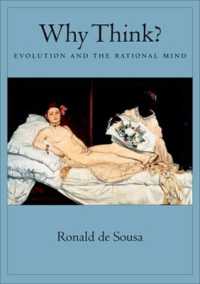- ホーム
- > 洋書
- > 英文書
- > Philosophy
基本説明
New in paperback. Hardcover was published in 2007. In this book, philosopher Ronald de Sousa looks at the twin set of issues surrounding the power of natural selection to mimic rational design, and rational thinking as itself a product of natural selection.
Full Description
In a world where natural selection has shaped adaptations of astonishing ingenuity, what is the scope and unique power of rational thinking?
In this short but wide-ranging book, philosopher Ronald de Sousa looks at the twin set of issues surrounding the power of natural selection to mimic rational design, and rational thinking as itself a product of natural selection.
While we commonly deem ourselves superior to other species, the logic of natural selection should not lead us to expect that nature does everything for the best. Similarly, rational action does not always promote the best possible outcomes. So what is the difference? Is the pursuit of rationality actually an effective strategy?
Part of the answer lies in language, including mathematics and science. Language is the most striking device by which we have made ourselves smarter than our nearest primate cousins. Sometimes the purely instinctual responses we share with other animals put explicit reasoning to shame: the movements of a trained athlete are faster and more accurate than anything she could explicitly calculate. Language, however, with its power to abstract from concrete experience and to range over all aspects of nature, enables breathtakingly precise calculations, which have taken us to the moon and beyond. Most importantly, however, language enables us to formulate an endless multiplicity of values, in potential conflict with one another as well as with instinctual imperatives.
In short, this sophisticated and entertaining book shows how our rationality and our irrationality are inextricably intertwined. Ranging over a wide array of evidence, it explores the true ramifications of being human in the natural world.
"This is a delightful book, in which de Sousa articulates some challenging convictions concerning the role of rationality in human thought, while also retaining and making deft use of some of his longest held views.... Why Think? is an important touchstone in helping us to understand how we can approach rationality as a phenomenon that must ultimately be part of a successful theory of mind."--Craig DeLancy, Notre Dame Philosophical Reviews
"De Sousa remarks: 'When enough people share a delusion, it loses its status as a psychosis and gets a religious tax exemption instead.' At that point, I knew I was going to love this book--and it is indeed a lot of fun. Why Think? is also good and clever. I have always said that the reason why philosophers are so disliked on university campuses is that we are brighter than anyone else and have trouble concealing the fact. Ronnie de Sousa does nothing to change this perception.... This is a great little book that should be read by many people." --Michael Ruse, Florida State University, Literary Review of Canada
"Why Think? is Ronnie de Sousa at his brilliant best-- immensely learned, witty, bold, and a model of clarity. This book is a timely balance to the weight of data emphasizing the emotions and nonconscious processing in decision-making. It weaves coherent story out of a lot of bits and pieces lying about in loose confusion." --Patricia Smith Churchland, President's Professor of Philosophy, University of California, San Diego
"This book is a tour de force of scholarly insights on one of the most subtle puzzles in cognitive science--the relation between rationality and evolution." --Keith E. Stanovich, author of The Robot's Rebellion: Finding Meaning in the Age of Darwin
Contents
Preface ; Acknowledgements ; 1. Introduction ; 2. Function and destiny ; 3. What's the good of thinking? ; 4. Rationality, individual and collective ; 5. Irrationality




